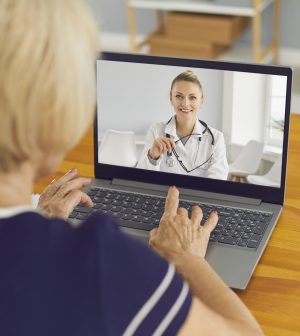- Could Artificial Sweeteners Be Aging the Brain Faster?
- Techniques for Soothing Your Nervous System
- Does the Water in Your House Smell Funny? Here’s Why
- Can a Daily Dose of Apple Cider Vinegar Actually Aid Weight Loss?
- 6 Health Beverages That Can Actually Spike Your Blood Sugar
- Treatment Options for Social Anxiety Disorder
- Understanding the Connection Between Anxiety and Depression
- How Daily Prunes Can Influence Cholesterol and Inflammation
- When to Take B12 for Better Absorption and Energy
- Epsom Salts: Health Benefits and Uses
‘Frailty Exams’ for Older Cancer Patients May Not Need Office Visit

Frailty exams are recommended for older adults who have blood cancer, and new research shows they can be done virtually, not just in person.
While the screenings are typically conducted at a clinic or doctor’s office, that became a challenge during the pandemic because people with blood cancers are at high risk of infection.
A new study assessing telehealth-based exams as a possibility found them to be a good substitute.
“Doing our 42-item assessment in the clinic required a lot of person-to-person contact,” explained study author Dr. Clark DuMontier, of Brigham and Women’s Hospital in Boston.
“We decided to adapt our in-person evaluation to a virtual format to prevent unnecessary viral exposure, but we still wanted to maintain our objective performance measures of cognition and walking speed. Our assessment is, to our knowledge, the first in blood cancers to evaluate both patient-reported and objective items together via telehealth,” DuMontier added in a news release from the American Society of Hematology.
Frailty assessments are recommended for seniors undergoing systemic therapy, such as chemotherapy. They incorporate objective performance measures, as well as questions like “Do you need help getting out of bed in the morning?”
The study included 185 blood cancer patients aged 73 and older between November 2020 and March 2022 who had virtual assessments. The research team compared their frailty classifications with a group of 876 patients who were 75 and older who completed the exam in person.
The investigators then evaluated the virtual assessment’s feasibility and safety based on how many participants successfully completed the evaluation. They monitored the patients for injuries.
About 81% of the participants who did the virtual testing completed the test successfully and had no falls or safety events during the study time. They were also found to have a slightly less frail status compared to the in-person group. This could just be from variation in different patients and not a difference in the assessment, the study authors said.
The study included both positives and limitations. On the plus side, immunocompromised patients could avoid in-person contact. The researchers also could monitor patient progress in the home, where measurements may be more accurate.
A limitation is that about 46% of the patients did not have a caregiver or videoconferencing technology, both of which would be needed to perform the gait assessment.
In the future, the team would like to expand access to technology, including monitoring devices, so that more patients can take advantage of telehealth resources.
“One challenge we encounter in hematology is that patients often come in to see us when they are at their best. So, when we see them in the clinic, they might look great, but that also might be the only day they got out of bed that week,” DuMontier said. “Being able to do these exams virtually allows us to assess patients in real time and potentially get more accurate scores. Using this assessment, we can measure frailty where it matters most, in their homes.”
The findings were published May 26 in Blood Advances.
More information
The American Cancer Society has more on all cancers, including leukemia.
SOURCE: American Society of Hematology, news release, May 26, 2022
Source: HealthDay
Copyright © 2026 HealthDay. All rights reserved.










